"We call upon the federal government to develop with Aboriginal groups a joint strategy to eliminate educational and employment gaps between Aboriginal and non-Aboriginal Canadians."
Truth and Reconciliation Commission of Canada: Legacy. Education. Calls to action (7)
As part of Silent Genomes capacity building, we will provide support for a total of 36 students to attend SING workshops through a directed scholarship donated by LifeLabs Canada.
The Summer Internship for INdigenous Peoples in Genomics (SING) is a week long workshop that brings Indigenous students and community members together to learn about genomics by providing hands-on experience, integrative lectures, and discussion about the ethical, legal, and social implications of doing genomics with Indigenous communities. The workshop is hosted by Indigenous faculty or faculty who work with Indigenous communities. The goal of the workshops are to train Indigenous students and community members in next-generation genomic and bioinformatics analyses and to build capacity for scientific research involving Indigenous communities.
Launched at the University of Illinois in 2011, and University of Otago in January 2016, these workshops are held yearly in the upper and lower hemisphere summers (June/July and January/February). More than 100 Indigenous students have attended SING programs since their onset.
SING Canada
SING US
SING Aotearoa (New Zealand)
SING Canada 2023
Date posted: 08/03/2023
Application deadline: March 31st, 2023
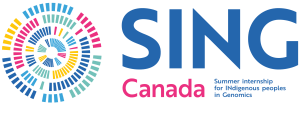
Silent Genomes is proud to announce the application for the Summer internship for INdigenous peoples in Genomics Canada (SING Canada) 2023. With the generous support of LifeLabs, Silent Genomes will provide 9 all-inclusive scholarships to Indigenous students/community members in Canada. SING Canada is a week-long, all-expenses-paid Indigenous science, technology, and society (Indigenous STS) training program. The 2023 SING Canada Workshop will be held July 16-21, 2023 in Edmonton, Alberta, Canada, and is open to Indigenous individuals who would like to learn about the basic of genomics, bioinformatics, and Indigenous and decolonial bioethics. This includes community college students, undergraduate and graduate students, and postdocs.
Building on the success of SING Canada’s 2022 workshop, #LandBack: Indigenous Peoples, Soil Science, and Disruptive Sequencing Technologies, the 2023 workshop will focus on urban Indigenous presence and geopolitics. A multi-disciplinary team of faculty members from Canada and the US will lead participants in a multi-locale comparative soil microbiome analysis with the goal of integrating Oxford Nanopore MinION sequencing technologies. Given that cities are Indigenous spaces, the workshop will highlight the need and opportunity to support Indigenous training in genomics from within the city of Amiskwaciwâskahikan (ᐊᒥᐢᑲᐧᒋᐋᐧᐢᑲᐦᐃᑲᐣ ). Read more and apply here...
SING Canada 2022
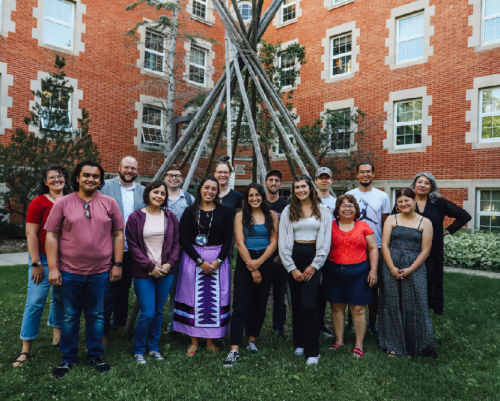
In-person SING workshop has been held Jul 11-15, 2022 at the University of Alberta. At the 5-day workshop titled “#LandBack: Indigenous Peoples, Soil Science, and Disruptive Sequencing Technologies” The participants have been introduced to mobile sequencing technologies and their role in metagenomic soil science. Read more...
SING Canada 2021
The Summer Internship for INdigenous Peoples in Genomics Canada (SING Canada) has been held over 4 days during the week of July 19-22, 2021 in a virtual setting with 8 Indigenous participants, including one person from Mexico. We combined some of our lectures with SING USA. Dr. Laura Arbour presented on the Community Genetics Program, Avery Newman Simmons on his graduate genetics thesis with a northern First Nation community, and Laurie Montour, Indigenous Community Engagement Coordinator, presented on the development of the Indigenous Background Variant Library. No scholarship funds were spent since there was no travel nor purchase of materials involved. Read more...
SING Aotearoa 2020
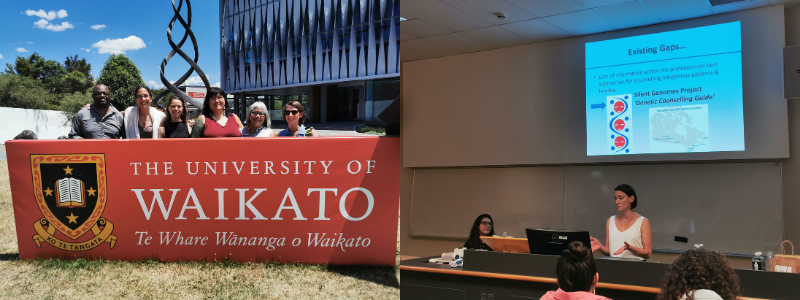
The Silent Genomes team traveled to New Zealand in January 2020 for three highly interesting meetings :
-
A discussion with “Genomics Aotearoa” to learn about their variome initiative and parallels to Activity 3 of the Silent Genomes Project: Building an Indigenous Background Variant Library in Canada (Hamilton).
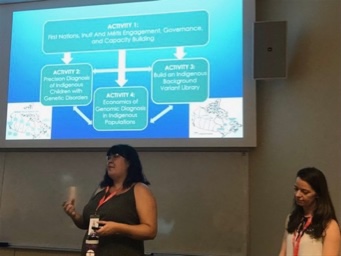
-
The SING alumni gathering 2020 which brought together alumni from across the SING consortia in the United States, Canada, New Zealand and Australia. Opening with a pōwhiri at Poihākena marae, and in line with SING itself, the attendees represented a broad cross-section of disciplines including scientists, social scientists, artists and elders (Raglan).
- The 1st SING Indigenous Genomics Conference where keynotes explored the main conference theme and the breakout speakers grouped into streams relating to ethics, genomic science, and the interface with indigenous knowledge. The presentations were recorded and the organizers are currently editing 48 hours of video to make the presentations available online (Hamilton).
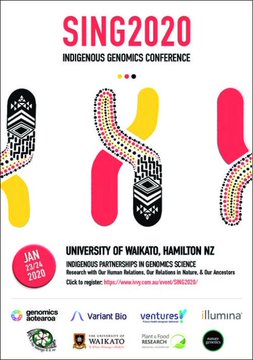
The Chief Editor of Nature Genetics attended the conference and wrote an editorial for the February issue commenting on the SING Conference and the importance of Indigenous genomics. The editorial titled ‘Necessary Voices’ can be found at https://www.nature.com/articles/s41588-020-0585-6
SING Canada 2019
Canada’s 2nd Summer Internship for Indigenous Peoples’ Genomics (SING) was another success thanks to the talents and dedication of Indigenous students and staff working for Native organizations and academic institutions across Canada. The week long internship was held at the University of Alberta in July 2019, with much gratitude to the leadership of Dr. Kim TallBear of the Native Studies Department and her diverse faculty. Silent Genomes has provided the second batch of scholarships to support 7 Indigenous students and community members to attend SING workshops with the generous support from LifeLabs Canada. This year’s timely topic was on Chronic Wasting Disease (CWD), an always fatal prion that may be present in deer, moose, and elk. It has implications for traditional food sources, harvest management, and use of animal parts for cultural practises of Indigenous peoples in Canada and the US. The internship has resulted in perhaps the first in-depth assessment of impacts to Indigenous peoples in Canada from CWD. A thank you for the generous assistance from University of Alberta’s Centre for Prions and Protein-Folding Diseases.
Congratulations to our SING 2019 scholarship recipients!
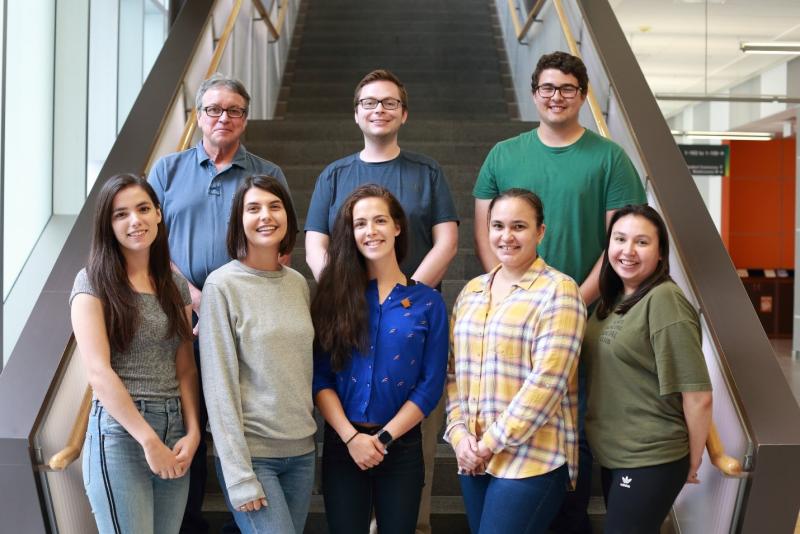
SING Canada 2018
The first SING Canada was held at the Simon Fraser University (SFU) on July 29 to August 4, 2018.
The program was led by Dr. Kim TallBear (University of Alberta), Faculty of Native Studies, supported by Dr. Felix Brenden, Department of Biological Sciences (SFU) and Dr. Jamie Scott, Department of Molecular Biology & Biochemistry (SFU), and designed in consultation with SING USA and SING Aotearoa. The workshop introduced advances in decolonial approaches to bioinformatics, and the genomic, ethical, environmental, economic, legal, and social (GE3LS) implications of genomic research with Indigenous communities and Peoples.
The workshop included presentations and discussion on Epigenetics, genes (genetic diversity, population differentiation, structure, and evolution), and community-driven & collaborative research. Participants were given the opportunity to gain experience in the wet Lab that included DNA extraction and purification that was later used in the bioinformatics labs for data analysis and phylogenetic results. Lastly, the workshop integrated cultural activities throughout the week such as medicine walks, cedar weaving, and opening prayers by local elders.
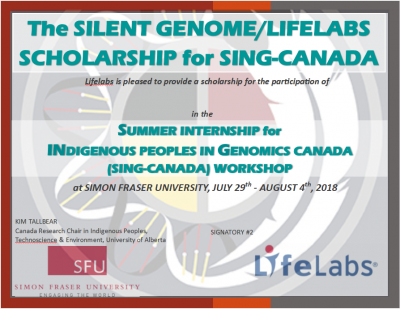
In 2018, we were happy to support nine participants from across Canada:
Scholarship Recipients
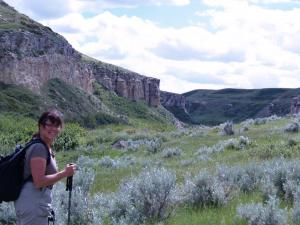 Berna-Dean Holland
Berna-Dean Holland
Berna-Dean Holland is an Alberta born member of the Métis Nation of Alberta, and a current MSc. candidate studying Ecology and Evolutionary Biology in the Department of Biological Sciences at the University of Calgary. She is writing her Thesis on behavioural factors affecting philopatry and life history patterns of yellow-bellied marmots (Marmota flaviventris), in the southern Alberta prairie region. Berna-Dean also works part-time as a wildlife technician, providing care to injured and orphaned wildlife. In her spare time, Berna-Dean is also a performing singer-songwriter (www.berna-deanholland.com). She also enjoys spending time in nature, and creating pastel portraits of wildlife. She is an advocate of naturalizing urban backyards to provide habitat for native birds, through planting and tending native flora in her urban home back yard. It is her deepest hope that through our commitment to understanding the biology, nature and limitations of our own and other species, that we will be thoughtful and gentle stewards toward the continued existence of all life of our Mother the Earth.
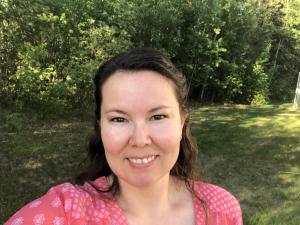 Donna Banach
Donna Banach
Donna Banach is a research assistant/coordinator with the Alliance Cohort study for Healthy and Hearts and Minds. She is currently working in Lac La Ronge, Sk. at the Jeannie Bird Clinic. Donna is a Woodland Cree and a member of the Lac La Ronge Indian Band. Her drive for health made it a natural fit for her to work with CAHHM. Donna completed her Bachelor of Science in Nursing in 2015 and has worked in the health sector ever since. She was awarded a SING Canada scholarship from Silent Genomes Lifelabs this past summer. From this scholarship she intends to share her experience and knowledge with others. Additionally she would like to further her own education in biology sciences.
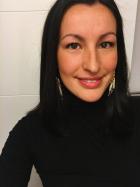 Chenoa Cassidy-Matthews
Chenoa Cassidy-Matthews
Chenoa hails from eastern Ontario and is a Nishnawbe member of Sachigo Lake First Nation, with Scottish and Irish settler heritage. Her family spans Canada from Vancouver to Halifax, and London to Taloyoak; her strong Nishnawbek lineage and large family drive her passion for Indigenous public health and wellness research. Chenoa’s background includes a Bachelor of Health Sciences from UOttawa and a Master of Public Health from SFU. She is currently a PhD student in Population and Public Health at UBC, living in Vancouver and working for the First Nations Health Authority in strategic policy and ethics.
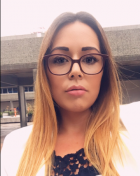 Jennifer Cameron
Jennifer Cameron
Jennifer Cameron is from Pictou Landing First Nation, a beautiful Micmac community nestled along the waterfront in rural Nova Scotia. While completing her Business Administration diploma in 2011 Jennifer started working with Mount Saint Vincent University in Halifax as a research coordinator (Food insecurity in First Nation communities). After completing her advanced diploma in International Business, Jennifer went to Cape Breton University to complete her BBA in Public Health. In addition to her studies, Jennifer is also a community research coordinator for the Canadian Alliance Healthy Heart and Minds project, as well as a research assistant for Dalhousie University.
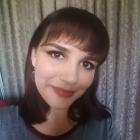 Kasey Stirling
Kasey Stirling
Kasey Stirling is an Indigenous, Two-Spirit woman of Nlaka'pamux, Mi'kmaq, Métis, and Acadienne ancestry. She attends Simon Fraser University as an undergraduate student, studying Molecular Biology and Biochemistry while working as a research assistant in Dr. Nancy Hawkins' asymmetric cell division lab at SFU. She graduated in 2017 from Dominion Herbal College with a Chartered Herbalist diploma. As a student representative of the Simon Fraser University First Nations Student Association, Kasey hopes to better the access to mental health care to Indigenous students.
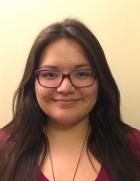 Yotakahron Jonathan
Yotakahron Jonathan
Yotakahron Jonathan is a Mohawk, Bear Clan born and raised on Six Nations reserve. She is a medical student at McMaster University’s Niagara Regional Campus. She is currently the Student Director for the Indigenous Physicians Association of Canada, McMaster’s Senior Local Officer of Indigenous Health for the Canadian Federation of Medical Students, and an Indigenous Mentor through the Indigenous Students Health Science office at McMaster. She was co-founder of the Indigenous Health Curriculum Action Group at McMaster which has been successful in pushing for more Indigenous Health into the medical school curriculum. She is a traditional doula trained at Tsi Non:we Ionnakeratstha and wants to continue providing support for birthing mothers and families in the future through her family practice. She recently participated in the SING Canada 2018 and is grateful for the opportunity. She thoroughly enjoyed the knowledge shared and connections made throughout the week.
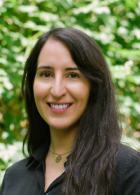 Krista Stelkia
Krista Stelkia
Krista Stelkia, Syilx/Tlingit from Osoyoos First Nation, is a Ph.D. Candidate in the Faculty of Health Sciences at Simon Fraser University working with Dr. Jeff Reading. Her research, funded by a Canadian Institutes of Health Research (CIHR) Doctoral Research Award, examines how structural racism impacts chronic disease in First Nations communities in Canada. In addition, she currently works as a Manager, Population Health and Wellness in the Office of the Chief Medical Officer at the First Nations Health Authority. Krista is committed towards participatory based research that is community driven and nation based. Her main research interests include racism and health, chronic disease, cultural safety and humility, trauma-informed emergency care and more.
Natalie Denny
Karista Olson
